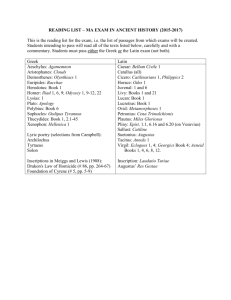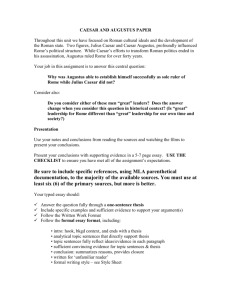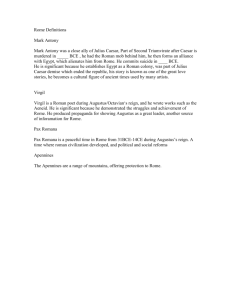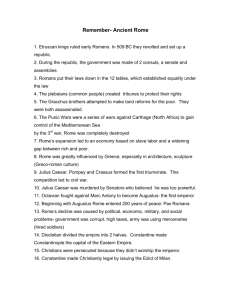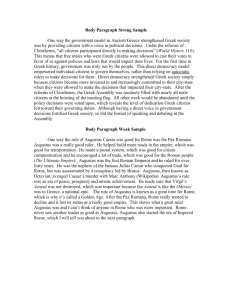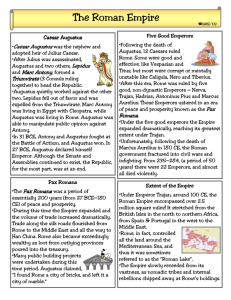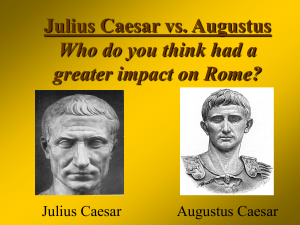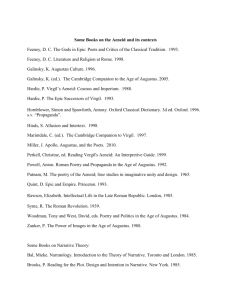Final Draft RRP
advertisement
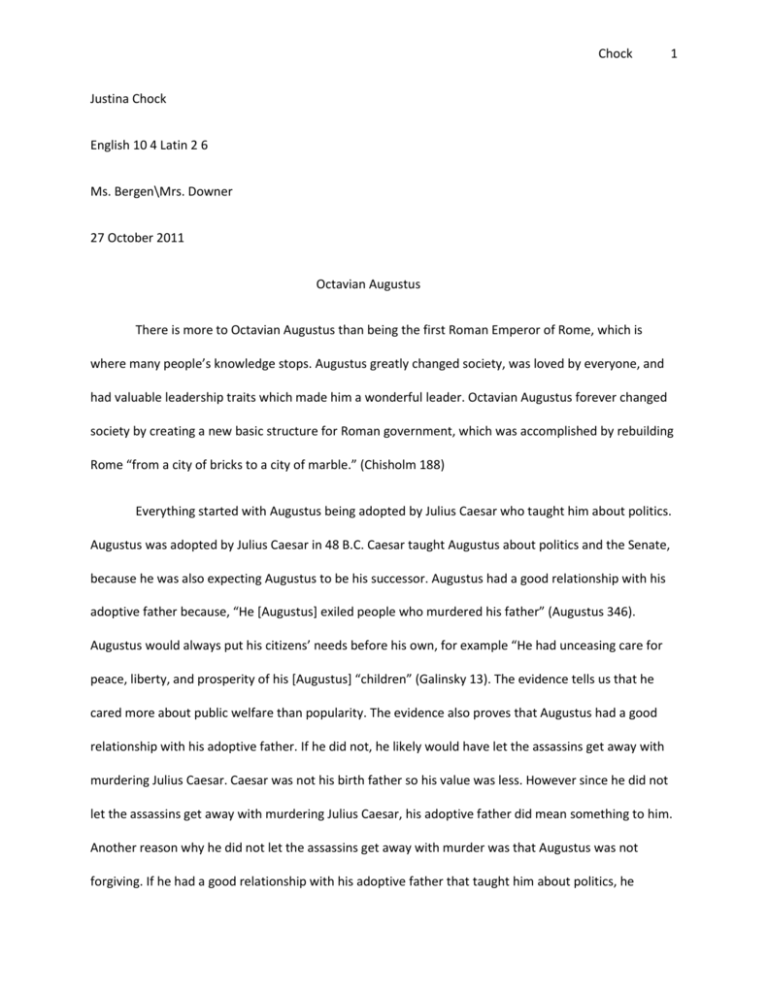
Chock 1 Justina Chock English 10 4 Latin 2 6 Ms. Bergen\Mrs. Downer 27 October 2011 Octavian Augustus There is more to Octavian Augustus than being the first Roman Emperor of Rome, which is where many people’s knowledge stops. Augustus greatly changed society, was loved by everyone, and had valuable leadership traits which made him a wonderful leader. Octavian Augustus forever changed society by creating a new basic structure for Roman government, which was accomplished by rebuilding Rome “from a city of bricks to a city of marble.” (Chisholm 188) Everything started with Augustus being adopted by Julius Caesar who taught him about politics. Augustus was adopted by Julius Caesar in 48 B.C. Caesar taught Augustus about politics and the Senate, because he was also expecting Augustus to be his successor. Augustus had a good relationship with his adoptive father because, “He [Augustus] exiled people who murdered his father” (Augustus 346). Augustus would always put his citizens’ needs before his own, for example “He had unceasing care for peace, liberty, and prosperity of his [Augustus] “children” (Galinsky 13). The evidence tells us that he cared more about public welfare than popularity. The evidence also proves that Augustus had a good relationship with his adoptive father. If he did not, he likely would have let the assassins get away with murdering Julius Caesar. Caesar was not his birth father so his value was less. However since he did not let the assassins get away with murdering Julius Caesar, his adoptive father did mean something to him. Another reason why he did not let the assassins get away with murder was that Augustus was not forgiving. If he had a good relationship with his adoptive father that taught him about politics, he Chock 2 probably learned a lot from him about politics, the Senate, and how to be an emperor. Since Julius Caesar was also looked upon as a good leader, he had good leadership traits that Augustus inherited. Augustus was considered a great leader because of his good leadership traits, which were probably taught to him by Julius Caesar. Thus the result of being adopted by Julius Caesar, Augustus had great honor and good leadership traits. A major thing that Augustus did that led to society being changed was that he joined forces with Antony. Antony was a man that was originally Augustus’s enemy, and created a new structure for the Roman government. After the assassination of Caesar, Augustus went into the large and confusing world of politics. Antony tries to remove Augustus from the Senate making Augustus and Antony enemies. But in 43 B.C. he and Antony join forces and he obtained most of Western Europe. After becoming the emperor of Rome, “Augustus created a new basic structure of the Roman government that lasted for three hundred years” (Nicolaus of Damascus 130). Augustus was very determined to fulfill his deceased adoptive father’s wish to be his successor. Yet Augustus was not the person to have all the power for example, “He [Augustus] did not want the role of a monarch” (Galinsky 13). Many people told Augustus that he should go into hiding and not into the Senate. This shows Augustus was dedicated to being a successor, but when he joined forces with Antony it was surprising. His army that he used against Antony had a total of eight legions. Augustus was unforgiving, but perhaps a leadership trait was telling him to forgive Antony. It would not be a good idea for him to have all the power over Rome. Rome is a giant country that would take an insane amount of work to control and manage. A good leader would ask for help when faced with something too challenging to handle. That is what Augustus did with Antony. This shows that Augustus is a very dedicated, but not arrogant, person. Nobody likes an arrogant person; therefore this shows another reason why if Augustus needed to join forces with Antony, to become emperor of Rome. Otherwise, he would not have changed society. Of joining forces with an enemy lead him changing society. Chock 3 What Augustus did that changed society was remodeling and rebuilding Rome. Octavian turned a city of brick into a city of marble. He made the buildings in Rome safer and more efficient to use, and everything became more modernized. He did this because “Octavian received good teaching, which developed his intellectual curiosity” (Baker 9). Octavian was also in control of what he was planning and thinking for example, “He had a clear literary style” (Baker 279). This explains why Augustus had the idea to transform Rome from a city of brick to a city of marble. This shows that he knew what he wanted to do, he had a plan. Augustus was already a very smart person, but when Julius Caesar taught him leadership qualities, he became even smarter. Just as person who is already talented in singing can take singing lessons to improve and be in plays or make it to on Broadway! A person needs to already have talent, and then have guidance for their talent. Finally they can shine with their talent, and this is a three-step process. Octavian did not need help with becoming smart since he already was, but he did have guidance, making him a very thoughtful person who would really help when he became emperor of Rome. And his statues are built with an intellect look on his face. Augustus also liked to live simply as well, so making the Roman buildings more modern was his goal. He did not want them to be more fancy or artful, but he wanted his citizens to feel more safe and be able to use the buildings more easily. It is an important thing to know that a building will protect someone from natural disasters and from criminals. That is what Augustus wanted his citizens to feel. He hired night watch men to protect Rome from enemies, fires and floods. Overall, turning a city of bricks into a city of marble, changed society. Augustus surrendered his throne as emperor of Rome in 27 B.C. but he decided to come back and rule for thirty more years. This shows that he was a very much loved Emperor by many people. Also, people created events to honor Augustus after he died such as, “A calendar of festivals to be celebrated in honor of Augustus” (Ross Taylor 119). Not only was he honored by festivals dedicated to him, buildings were built after he died, one of them being “A temple to Augustus built in 4 AD” (Ross Taylor 119). This explains that he was a very popular and he was still remembered after his death. If people Chock 4 have a memory of someone years after they died and they build temples and dedicate festivals to them, they certainly did something important and everyone admired them. Even though he listened to what other people had to say, he still chose what he wanted to do. That was to resign from being emperor of Rome. This shows that he was not a person who relied on what people said. Of course he did value what others said because he decided to become emperor again for thirty years. Therefore he did not become emperor again simply because he followed the options of more than thousand people said. It is because he valued what they said and decided that if they remained stubborn about him being leader again, he should take back his position as ruler. Therefore because of Augustus great personality with his wonderful leadership traits and how greatly he changed society, he was much loved by everyone and is still remembered today in books, on the World Wide Web, and journal articles. In conclusion Augustus was a good person. He rebuilt Rome with a new structure that lasted for three hundred years, he had many great leadership traits that he learned from his adoptive father Julius Caesar, and he learned to get along with his enemy Antony. He teaches us a valuable lesson that we should get along with each other and forgive our enemies because we might need their help one day. Plus, everything needs improvement. Augustus was already smart, but the guidance from Julius Caesar turned him into a genius! Also Rome was ok being a city of bricks but Augustus improved the buildings and turned it until a city of marble. He shows that it is good to listen to yourself, not always to other people. All the Romans were persistent for him to stay emperor of Rome but he listened to himself and resigned, it was the stubbornness of his citizens that caused him to take back his throne. Augustus put an end to the decay of the Republic and witnessed three major political reinventions in his lifetime. He used many leadership traits such as not being arrogant and being dedicated to the task given, by changing Rome from the city of bricks to the city of marble, he changed society itself. This is why he was one of the greatest and most important rulers of the Roman Empire. Chock Works Cited Galinsky, Karl. The Cambridge Companion to the Age of Augustus. New York: Cambridge University Press, 2005. Print Nicolaus of Damascus. Life of Augustus. Clayton M. Hall 1923. Web. Taylor, Lily Ross. The worship of Augustus in Italy during his Lifetime. New York: The John Hopkins University Press, 1920. Print Res Gestae of Augustus. Res Gestae Divi Augusti. New York: Loeb Classical Library, 1924. Web. Baker , G. P. Augustus. New York: Dodd, Mead and Company, 1937. Print. Chisholm, Kitty. Rome the Augustan Age. New York: Oxford University Press, 1981. Print. 5
